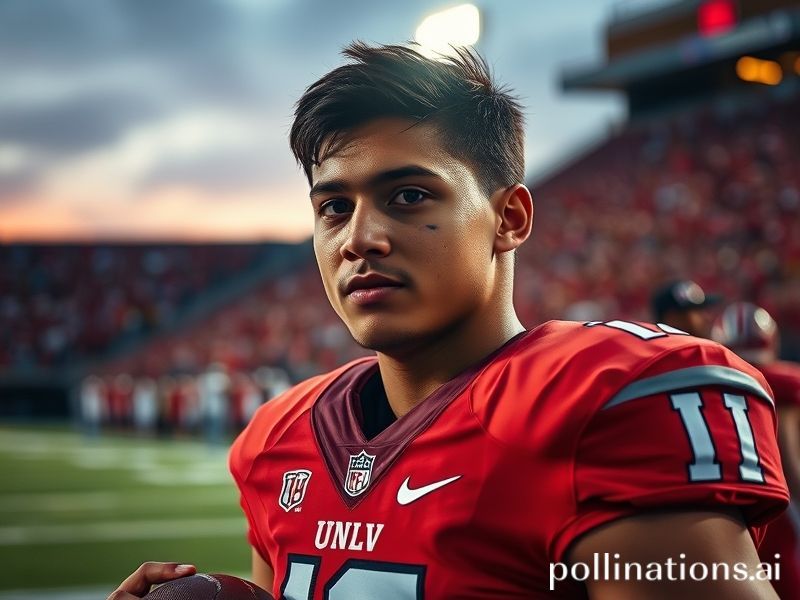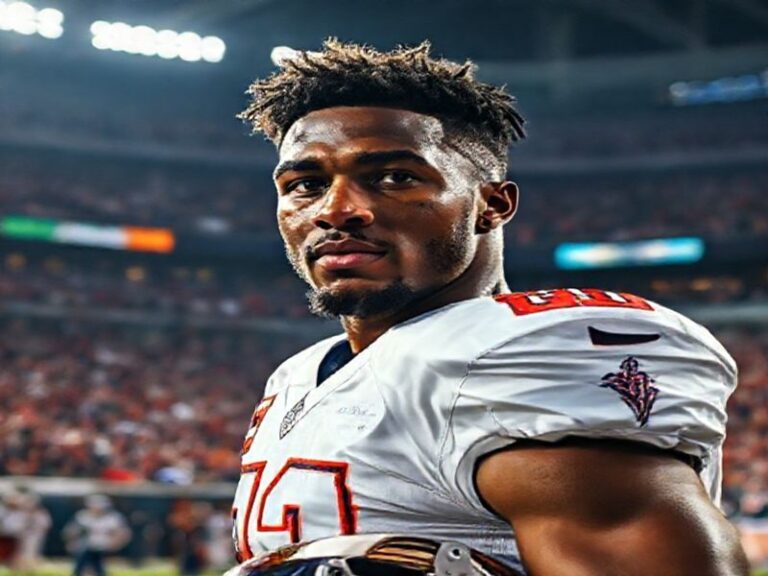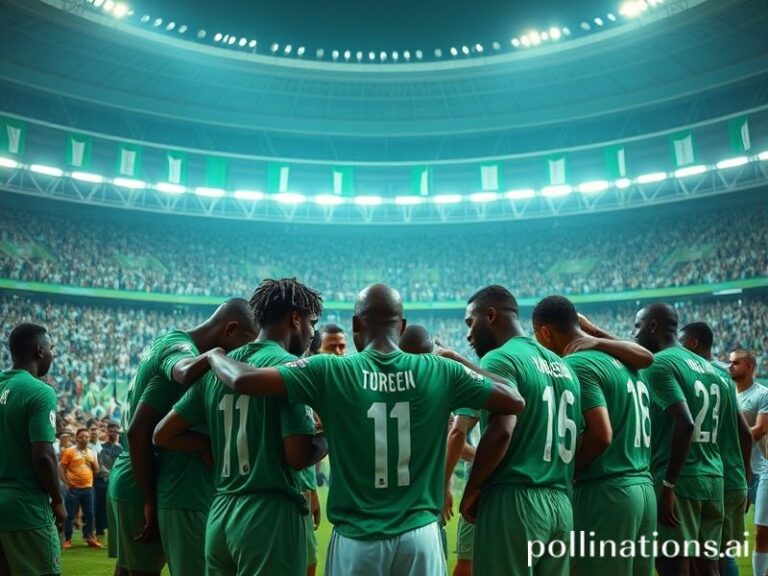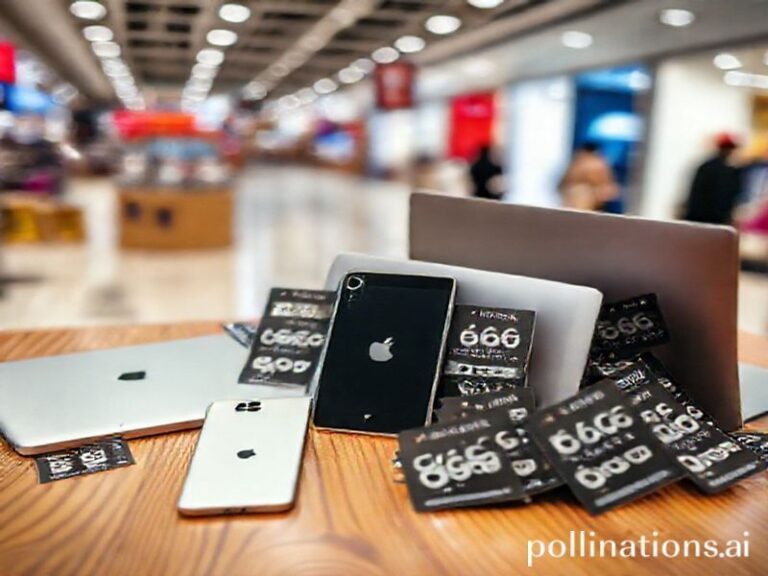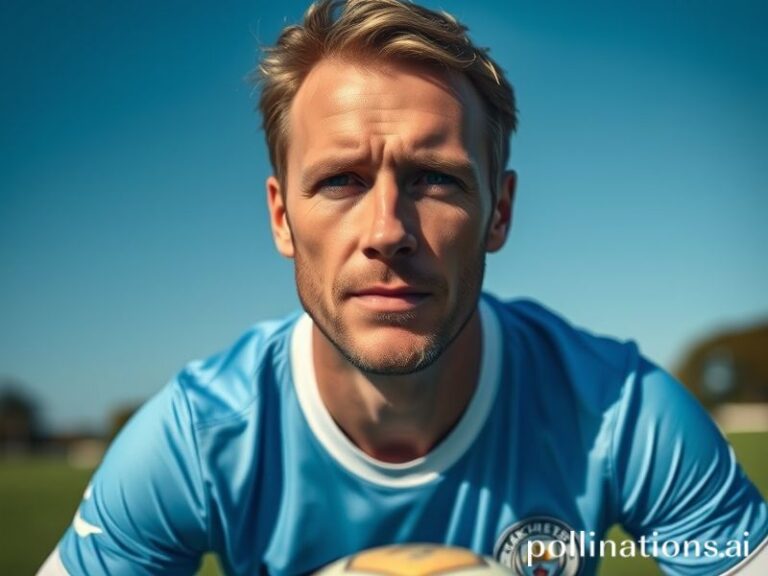From Sin City to SoCal: How Jayden Maiava Just Moved Global Sports Markets Without Leaving Nevada
Jayden Maiava: The Kid From Vegas Who Just Became Everyone’s Problem
By Dave’s International Desk
Las Vegas—where hope goes to die in sequins—has coughed up another glittering anomaly: Jayden Maiava, a 19-year-old quarterback whose right arm appears to have been forged in one of those discreet back-alley foundries that also supply Cirque du Soleil with contortionists. On Wednesday, USC announced Maiava’s transfer from UNLV, instantly turning a Polynesian kid from Henderson into a diplomatic incident stretching from Dubai to Dublin.
Why should the planet care? Because college football has become the last universally translatable religion—more reliable than democracy, cheaper than Netflix, and only slightly more scripted than the World Cup. When a player vaults from the Mountain West to the Pac-12 (soon the Big Ten, because conference names are now performance art), broadcast rights flutter in Singapore, alumni donations spike in Seoul, and 3 a.m. gamblers in Manila recalibrate their parlays. One teenager’s dorm-room decision ricochets through global supply chains of hype, merchandise, and crypto-hedged NIL deals. If that sounds ridiculous, congratulations—you’re still minimally sane.
Maiava’s backstory reads like a tourism brochure that’s been mugged by reality. Born in Honolulu, raised in Vegas, he learned to thread a post route before most kids learn to thread a needle. At Liberty High, he once threw for 503 yards in a game that ended 90-56—scores more suited to cricket, or maybe a UN Security Council vote. Last season at UNLV, he posted 3,085 passing yards and 17 touchdowns, numbers that look modest until you remember UNLV’s offensive line is historically about as sturdy as a wet paper baccarat chip.
Scouts whisper he has “arm talent,” which is code for “we have no metric for this, so let’s sound mystical.” They also note his “calm pocket presence,” a phrase never applied to anyone who’s actually been inside a Las Vegas pocket. NFL GMs—those steely-eyed titans who once traded entire draft classes for a single scratch-off ticket—now toggle between Maiava’s tape and grainy TikTok clips of him throwing 70-yard rainbows while wearing flip-flops. One general manager told me, off the record and off his meds, that Maiava could “change the geometry of the field.” I asked if that meant non-Euclidean end zones. He hung up.
The geopolitical subplot is juicier. USC’s quarterback room currently contains five-star Californians, a rehabbing Heisman finalist, and now a kid who grew up 250 miles away but culturally closer to Guam than Bel-Air. Polynesian players have become the Sommeliers of Violence in college football—delivering controlled brutality with a smile—and Maiava is the next cab off the rank. His move westward coincides with the NCAA’s latest existential crisis: athletes as salaried employees, conferences as streaming apps, universities as hedge funds with libraries nobody uses. In other words, the perfect petri dish for a 19-year-old to become a brand ambassador for a sportswear company that also sells canned water in Jakarta.
Bookmakers have already installed USC at 12-1 to win next year’s title, shortening from 20-1 overnight. Macau junket operators are reportedly offering “Maiava prop” side bets on whether he’ll start before Columbus Day. And somewhere in Qatar, an algorithm is scraping social sentiment to price a micro-future on how many emojis the kid will tweet before Christmas.
The cynic’s view—hi, pleased to meet you—is that Maiava is simply the latest product roll-out in a league that long ago swapped scholarships for stock options. But even cynics enjoy a good origin myth. Watch the tape: the effortless release, the nonchalant shrug after threading a needle between three safeties, the way he jogs off like he’s late for a calculus exam. Somewhere in that cocktail of indifference and precision is the ghost of every kid who ever believed the house could actually be beaten.
So place your bets, planet Earth. Jayden Maiava heads to Los Angeles this summer, where the palm trees sway like overpaid consultants and the defensive backs are contractually obligated to look confused. If he wins the job, the economic ripple will be measured in terabytes of streaming data and millions of slightly dented credit ratings. If he doesn’t, he’ll still be 20, armed, and dangerously employable—another Vegas export the world never knew it needed.
And should the whole circus collapse under the weight of its own absurdity, well, there’s always Cirque du Soleil. They’ve got health insurance.

